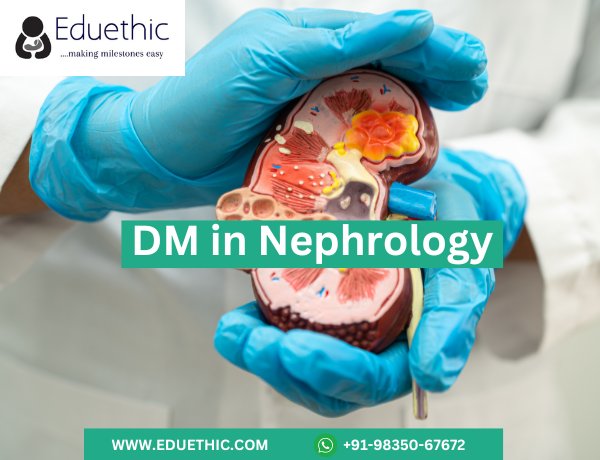How Long Is The DM Nephrology Course?

D.M. Nephrology or Doctor of Medicine in Nephrology is a Doctorate Nephrology course. Nephrology is a branch of internal medicine and pediatrics that deals with the study of kidney function and diseases. The main aim of the D.M. (Nephrology) program is to provide training to the candidates in the specialty of Nephrology, encompassing the related knowledge, skills, research methodology, and attitudes. Subsequently, this course enables them to function as independent clinicians/consultants, teachers, or research scientists. The course is three years and offers widespread opportunities in the government and private sectors, including self-employment.
Course Highlights
|
Course Level |
Doctorate |
|
Duration |
3 years |
|
Examination Type |
Semester System |
|
Eligibility |
MBBS completed from a university recognized by the Medical Council of India |
|
Admission Process |
Counselling after qualification of entrance examination |
|
Top recruiting organizations |
Hindustan, Oregon, Integro, etc. |
|
Top recruiting areas |
Manipal healthcare enterprises, ILBS, colleges and universities, and such. |
|
Top job profiles |
Product Manager, Dialysis Medical Officer, Nephrology Specialist, among others. |
|
Course Fee |
INR 5,000 to 20 lakhs |
|
Average Starting Salary |
INR 5 to 30 lakhs |
Eligibility Criteria
- Candidates must have a PG (MBBS or equivalent degree) completed from an institute acknowledged by the Medical Council of India or any State Medical Council.
- At the post-graduation level, there is a minimum aggregate mark of 55% (50% for SC/ST/OBC candidates).
- 1-year compulsory rotating internship.
- Preferably, at least 12 months of professional experience, as most reputed institutes prefer students with work experience.
Admission Process
Generally, in most colleges and institutes offering the program, admission is provided based on the candidate’s performance in a relevant entrance exam conducted at any State and national level, followed by a subsequent round of counseling.
The round of counseling involves two additional rounds of Group Discussion and Personal Interviews, wherein the candidate’s general aptitude for the course is examined. The institute subsequently releases and issues a merit list, allocating available seats to the qualifying candidates.
Syllabus
|
YEAR I |
YEAR II |
YEAR III |
|
Anatomy and embryology of the kidney |
Basic knowledge of Renal Pathology |
|
|
Physiology of the Kidney |
Basic knowledge of Renal therapeutics |
Kidney diseases in Pregnancy |
|
Basic and advanced investigations in renal diseases |
Basic training in Renal Radiology |
Glomerular diseases |
|
Fluid and Electrolyte disorders |
Kidney diseases in children |
Interstitial diseases |
|
Basic knowledge of Immunology |
Hereditary congenital kidney diseases |
Hypertension Vascular diseases |
|
- |
- |
Kidney disorders in geriatrics |




















